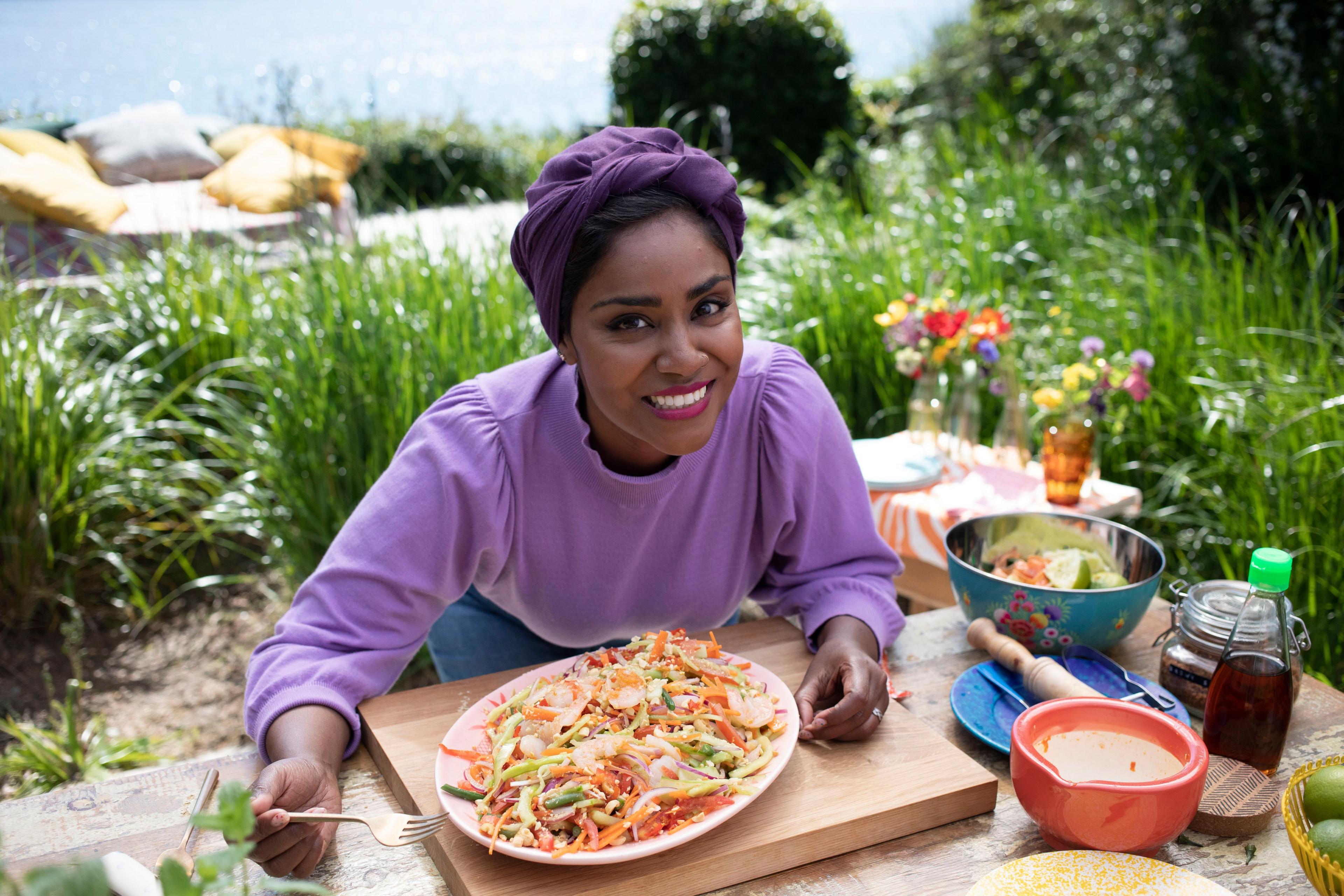Nadiya Hussain: 'Constant pressure to prove how British I was'

Nadiya Hussain's latest series is a celebration of food waste
- Published
The host of Nadiya's Cook Once Eat Twice talks Bake Off, anxiety and the joys of eating banana peel.
Unsurprisingly for one of Britain’s best-loved cooks, one of Nadiya Hussain’s earliest memories is of food.
She recalls her father toiling all day and night to cook a whole sheep for her extended family. “I must have been about five,” the Great British Bake Off winner says. “I remember my dad digging a hole in the garden and creating a huge fire.”
This memory taught her two important things, she says: that food has the power to bring families together - and how to make the most of your ingredients.
“I grew up in an immigrant household,” she says, and her parents never threw any food away.
These early experiences inspired her latest series, Nadiya's Cook Once Eat Twice, all about finding delicious solutions to food waste.
Recipes include a carrot soup that transforms into a fish curry, as well as a dish using banana peel. “It doesn’t taste like banana is all I’m going to say, because I think that’s the fear,” she says.
The latter recipe is central to what Nadiya wanted to achieve with her new series. “People are much more conscious of what they’re wasting. And they want to save money. Even if it saves a few pennies, it makes a world of difference.”
'Huge part of my healing'
Her new show follows cooking series Nadiya's Fast Flavours, travel show The Chronicles of Nadiya, and Nadiya: Anxiety and Me, when she opened up about her mental health struggles.
Years on from her documentary on anxiety, that saw her discuss the violent bullying she experienced as a child and when she faced her fears of travelling alone on public transport, Nadiya says she now has a “different handle” on her mental health.
“What I have accepted over the years is that it’s not something that’s going to go away. What I’ve done is really learn and understand what it is that triggers me.”
Thirteen million people saw Nadiya win The Great British Bake Off in 2015
Though publications such as the Radio Times have said her TV persona “fizzes with positivity”, Nadiya says she was struggling with anxiety throughout her time on The Great British Bake Off in 2015 - and beyond.
She was signed up for the show by her husband, who felt her family commitments had left her isolated. “I don’t know why he thought that putting someone who had anxiety and depression on the biggest baking show in the country would help me,” she says, “but clearly he had an intuition that I didn’t.”
She now calls the show “a huge part of my healing and understanding of my anxiety”. She adds: “It allowed me to push myself in a way I hadn’t done before, to face fears I didn’t even know I had.”
Those fears began before she had set foot in the famous tent. “I had never been in a taxi or train on my own, so that was really anxiety-inducing.”
Nadiya makes it clear that her experience on the show was a positive one, “the best thing I’ve ever done”. But watching it back, Nadiya says she can see the pressure she was putting on herself.
Nadiya initially struggled with being in the public eye
“I can see the panic in my eyes and in my face. Anyone who knows me could watch and see I’m out of my comfort zone. I gave myself ulcers, I was that anxious. Sometimes I just needed to go to the toilet and have a good cry.”
Speaking to her today, there is no sign of that panic, as she answers questions over Zoom while also looking after a small child.
“Education has definitely made my anxiety feel much smaller,” she says. “I’ve learnt not to put myself in certain situations that induce anxiety.”
'I was just displeasing myself'
The TV cook also found it difficult to adjust to fame, she says.
“I was quite delusional. I thought I’d done Bake Off and would go back to finishing my degree.”
While the show was airing, however, she remembers going to the supermarket and being recognised by fellow shoppers. “I went in for bread and milk, and two hours later I was still at the supermarket and just couldn’t get away from people coming up to me and taking pictures. It was scary and destabilising.”
She eventually learnt to cope with being recognised on the street, as well as one of the bigger downsides of fame: as a prominent British-Bangladeshi woman, she started receiving racist abuse on social media.
“There was constant pressure to prove how British I was, how Bangladeshi, how Muslim. And then I realised that by trying to please all these different groups, I was just displeasing myself.
“People are going to say I’m not British enough to do a trifle, or not Bangladeshi enough to do certain curries, but I just don’t really care. I’m quite happy in my grey area… which is very colourful, by the way!”